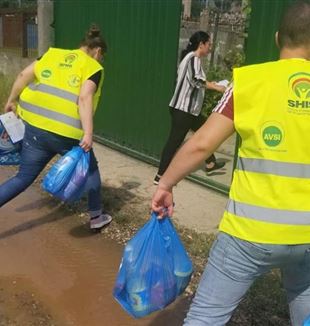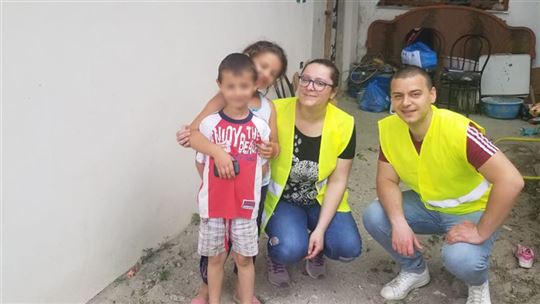
Albania: Impossible gratitude, between Covid and the rubble
First an earthquake in the autumn, then the pandemic. Yet, in a country already plagued by poverty and economic hardship, hope does not stop flourishing.Albania, November 26, 2019. A violent earthquake shakes the northern part of the country at 3.54 am. Durazzo, Tirana and Lezha all shake: 51 people die, 3,000 are injured, over 33,000 are displaced. The region did not have time to recover from the wound of the earthquake before it was overwhelmed by the pandemic, which has left thousands of families destitute. In this complicated context, just a few steps from our home, workers of SHIS (International Association for Solidarity), who have been a local partner of AVSI for over twenty years, are working.
Roberta Profka, director of SHIS, talks about the work that has been done in these months: "This situation has not made us back down, but has pushed us to dare even more. We have been working in Albania since the war in Kosovo, when we helped refugees fleeing the conflict by running 16 reception centres. Since then we have grown up, focusing on socio-educational projects and distance support." Today, more than 700 children are supported, with the association assisting several day centres (one of them, the "Little Prince" on the outskirts of Tirana), and being involved in many socio-educational projects.
"The earthquake and Covid have been dealing the cards and have forced us to widen our gaze." She says that there is a great need: there are more than ten thousand people who have been living in makeshift tents since November, in areas where SHIS is active: "We started working during the emergency by providing food packages to these families, together with hygiene kits clothes, blankets, and pillows to help them get through the winter. The Coronavirus crisis, however, has forced them to review the organization's modus operandi on all fronts.
"We have always been present in schools, but they were closed because of the lockdown, and this has led to many difficulties for both teachers - often not equipped with adequate equipment for distance learning - and for many children who have no way to connect to the internet. It suffices to say that some families do not even have a telephone. We have investigated new ways to be present. First of all, by supporting teachers by telephone, and then by trying to reach the pupils of the schools we assist, so that that no one would be excluded.
Thus, in addition to food and other basic necessities, we also delivered teaching materials so that the children could continue to do their homework or attend classes. At the same time, we supported their parents, who are experiencing this time of crisis, often stressed or desperate." Roberta also says that, in collaboration with the Ministry of Education, SHIS has worked to create "play corners" equipped with video projectors, books, markers, educational materials and games where children can unleash their creativity, even in the tent camps or hotels where earthquake victims are housed. "They are spaces that have the double task of preventing children from ending up on the street or in bad company, and at the same time they can help in teaching, because teaching is still very rigid and theoretical in Albania. For this reason, we thought to support teachers with animators, to make the school a creative and playful learning space." They have also launched afterschool support projects, for civic education and for the creation of spaces where parents and the community can be welcomed.
"We take care of over a hundred families who were already in trouble before the pandemic and who have now plunged into the darkest misery. We have cases of families with four or five children surviving on 52 euros a month. Most of them were working illegally before Covid, and isolation has forced them to suspend all activity. Without any support from the state, they are invisible, exposed to hunger and destitution. We are giving them food packages and now, as summer approaches, we are setting up a supply of summer clothing." This service has been made possible by the local authorities that have authorized the NGO to move freely within the territory: "We initially had some difficulty in finding protective masks to distribute to families, but Providence did not abandon us: we managed to initiate a collaboration with a convent of Salesian nuns who, in their small tailor's shop, sewed the devices we needed."
What Roberta takes home in the evening is a great gratitude: "The situation is difficult, but we see so many small gestures of solidarity flourish.” She too lost her house in the earthquake, but she never gave up. "In everything that happens we do not stop looking for the positive," she explains, moved: "One of the most beautiful things is listening to the stories of our operators when they return from the distribution of food parcels: they are happy because they feel part of something big. Sometimes all it takes is handing out a scarf to make a mother happy." A gratuitousness that reverberates in the families themselves, as the son of one of the most vulnerable families supported by SHIS in Lezha testifies: "I am happy with these stockings, this blanket, this scarf designed for me. But ifmy brother were to feel colder than me, I would give them to him immediately and I would do the same for my mother, when she comes home in the evening tired and cold from work. They are wonderful gifts, I will not keep them just for myself."
Read also – Kenya: The horizon is beyond the village
Roberta is a volcano of ideas, but she has no illusions that everything will end with the end of the epidemic: "The economic crisis will hit hard in the coming months. Families are now somehow getting by with the few savings they have, but an internal survey of the 300 families we help, found that 70% of them will struggle to recover. We will only really understand the scale of the challenge after the summer. We roll up our sleeves, we will not be found unprepared. Because it is from these families that our country will start again and we want to be at their side."